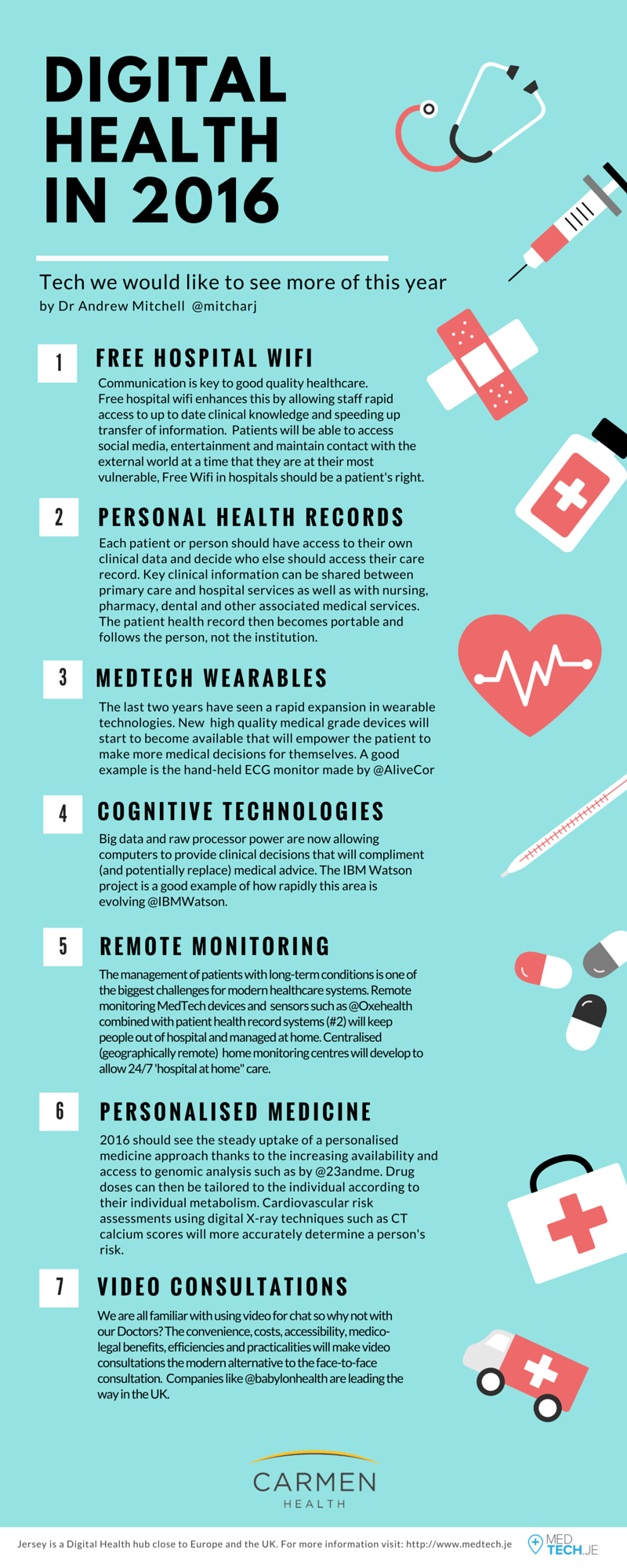Digital Health in 2016
6 January 2016 / 11:01 am
Tech we would like to see more of this year
1. FREE HOSPITAL WIFI
Communication is key to good quality healthcare.
Free hospital wifi enhances this by allowing staff rapid access to up to date clinical knowledge and speeding up transfer of information. Patients will be able to access social media, entertainment and maintain contact with the external world at a time that they are at their most vulnerable, Free Wifi in hospitals should be a patient’s right.
2. PERSONAL HEALTH RECORDS
Each patient or person should have access to their own clinical data and decide who else should access their care record. Key clinical information can be shared between primary care and hospital services as well as with nursing, pharmacy, dental and other associated medical services. The patient health record then becomes portable and follows the person, not the institution.
3. MEDTECH WEARABLES
The last two years have seen a rapid expansion in wearable technologies. New high quality medical grade devices will start to become available that will empower the patient to make more medical decisions for themselves. A good example is the hand-held ECG monitor made by @AliveCor
4. COGNITIVE TECHNOLOGIES
Big data and raw processor power are now allowing computers to provide clinical decisions that will compliment (and potentially replace) medical advice. The IBM Watson project is a good example of how rapidly this area is evolving @IBMWatson.
5. REMOTE MONITORING
The management of patients with long-term conditions is one of the biggest challenges for modern healthcare systems. Remote monitoring MedTech devices and sensors such as @Oxehealth combined with patient health record systems (#2) will keep people out of hospital and managed at home. Centralised (geographically remote) home monitoring centres will develop to allow 24/7 ‘hospital at home” care.
6. PERSONALISED MEDICINE
2016 should see the steady uptake of a personalised medicine approach thanks to the increasing availability and access to genomic analysis such as by @23andme. Drug doses can then be tailored to the individual according to their individual metabolism. Cardiovascular risk assessments using digital X-ray techniques such as CT calcium scores will more accurately determine a person’s risk.
7. VIDEO CONSULTATIONS
We are all familiar with using video for chat so why not with our Doctors? The convenience, costs, accessibility, medico-legal benefits, efficiencies and practicalities will make video consultations the modern alternative to the face-to-face consultation. Companies like @babylonhealth are leading the way in the UK.

More Posts
16 March 2024
Developing a new strategy for healthy Islanders
4 February 2024
A digital health diary for Jersey
27 December 2022
Utilising artificial intelligence in cardiology practice
12 June 2022
Under the bonnet – time for your heart’s MOT
12 March 2022
What is heart valve disease and what does that mean for me?
12 January 2022
Preventing heart disease using augmented digital health intelligence
1 October 2021
How heart health has been impacted by COVID-19
1 August 2021
The importance of the rhythm of your heart
21 June 2020
What is atrial fibrillation?
8 April 2020
Coronary heart disease and risk of heart attacks
11 January 2020
The Era of Immersive Health Technology
22 September 2019
The heart and stress
18 August 2019
Screening for Atrial Fibrillation and the Role of Digital Health Technologies
20 November 2018
Ectopic beats – how many count?
28 July 2018
How can immersive VR and AR technologies improve your physical and mental health?
7 March 2018
“The patient takes charge” – enhanced care with Digital Health technologies